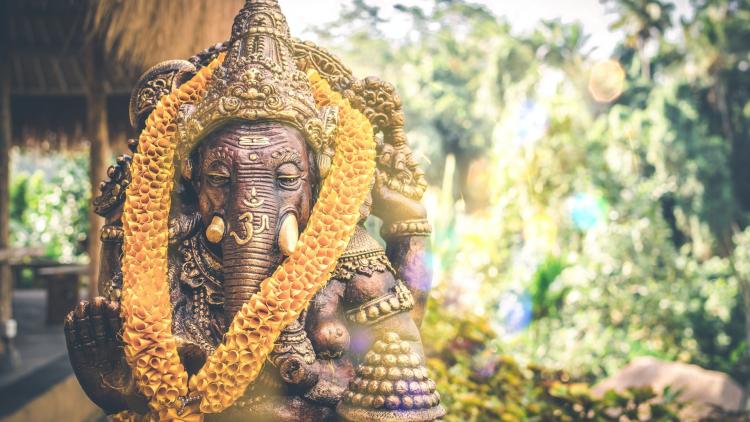Modern Indian Philosophy

Key information
- Status
- Module not running
- Module code
- 158000192
- FHEQ Level
- 6
- Credits
- 30
- Department
- Department of Religions and Philosophies
Module overview
This course provides a comprehensive introduction to key thinkers and visionaries in Modern Indian Philosophy, and the impact of their ideas on philosophical and political life today. The course incorporates an introduction also to key Western philosophies which have found import and syncretic re-imagining within the Modern Indian context. The course also has a strong social, political and aesthetic bent, as we examine questions of National identity, Post-Colonialism and responses to modernity, made the more pertinent after the British Raj. Last, but not least, we cast a critical eye on the very process of research itself, in order to enter into a mini research project of our own, in a reflective and self-conscious manner.
Objectives and learning outcomes of the module
On successful completion of this course a student will be able to:
- identify some of the foundational problems and issues of modern Indian philosophy and its political and social context
- critically engage with select Indian philosophical texts of the modern period and identify, summarise, and criticise, in an intellectually sensitive way, the philosophical positions of these texts
- relate some of the core concepts and theories of modern Indian philosophy to concepts and ideas in classical Indian philosophy and contemporary European thought
- identify different ways of “doing philosophy”, develop an ability to use a variety of philosophical approaches in addressing contemporary issues, and gain an appreciation of how these approaches may be integrated more practically as a “way of life”.
Scope and syllabus
- The Course is structured in four parts; Hinduism and the Colonial encounter, Philosophies of Syncretism in Modern India, Visions for Modern/ Postmodern India, and India and the Problem of “Modernity”.
- The rationale for the First axis is that our view of the present and future is meaningful only when grounded within social and ideological history. The tendency within analytic philosophy has been to treat thinkers as pure intellects unbound to space, time and cultural persuasion but, there is no view from nowhere, and our understanding of these thinkers entails an engaging and critical examination of Hinduism, its key texts, philosophies and concepts, as well as its response to the Colonial encounter. We also examine the problem of Hinduism as an object of study for the Western academy.
- The Second axis focusses on a group of Indian philosophers who have responded creatively to Post Kantian thought, interrogating it through their grounding in Indian darshana, and, in some cases, giving it a political spin, through a rhetoric of global, unified philosophy. We will examine key ideas within the Metaphysics of Kant, Hegel, Nietzsche, even Darwin, and see how they are recast, synthetised and often challenged through the retrieval of ancient philosophy.
- The Third axis focuses upon key visionaries of Modern India and their attempts to find meaningful national, and in some cases international, (or even “trans-National”) identities for India. In each case we will critically examine not only the primary texts of the thinker, but also the way in which their thought and aspirations have been crystallised in communities, and studied within the academy. This will provide food for thought for our own research into one of these visionaries and their reception, interpretation or application.
- The Fourth axis problematizes the concept of modernity, firstly through the eyes of political and aesthetic thinkers, and secondly through the eyes of the researcher. How did modernity in turn colour the lens through which the academy studied India? Are there are any, more useful, frameworks we might turn to in our aim to see, understand and learn more deeply?
Method of assessment
- ONE 1,000 word project proposal and bibliography (10%)
- ONE 1,500 literature review (20%)
- ONE 3,000 word essay (70%)
Suggested reading
- Aurobindo. 1949/1970. The Life Divine (Pondicherry: Sri Aurobindo Ashram).
- Bhattacharya, K.C. 1930. The Subject as Freedom (Amalner: The Indian Institute of Philosophy).
- Bhushan, N. and Garfield, J. L. eds., 2011. Indian Philosophy in English: From Renaissance to Independence (Oxford: Oxford University Press).
- Gandhi, Gopalkrishna. ed., 2008. The Oxford India Gandhi: Essential Writings (New Delhi: Oxford University Press).
- Krishnamurti, J. 2007. Collected Works, Vols. I-III (New Delhi: Motilal Banarsidass).
- Heehs, P. ed., 2013. Situating Sri Aurobindo: A Reader (New Delhi: Oxford University Press India).
- Parel, A. J. 2006. Gandhi’s Philosophy and the Quest for Harmony (Cambridge: Cambridge University Press).
- Raghuramaraju, A. 2007. Debates in Indian Philosophy: Classical, Colonial, and Contemporary (Oxford: Oxford University Press).
- Raghuramaraju, A. ed., 2014. Debating Vivekananda: A Reader (New Delhi: Oxford University Press India).
- Ray, M.K. ed., 2012. Selected Essays: Rabindranath Tagore (New Delhi: Atlantic).
- Sorabji, R. 2012. Gandhi and the stoics: Modern experiments on ancient values (Oxford: Oxford University Press).
- Vajpeyi, A. 2012. Righteous Republic: The Political Foundations of Modern India (Harvard: Harvard University Press).
Convenor
Disclaimer
Important notice regarding changes to programmes and modules


